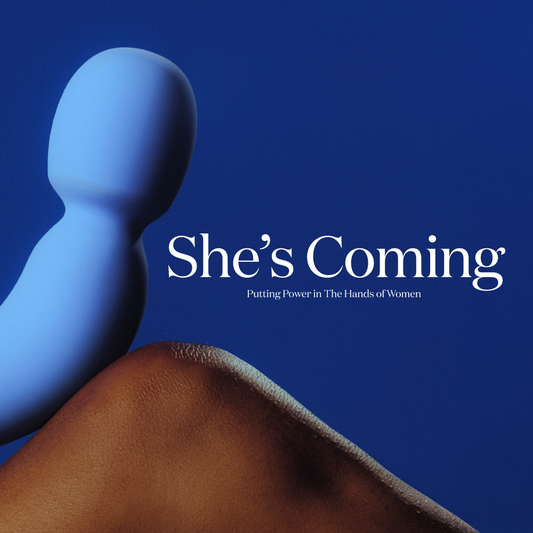When I was 12 or 13, my mother gave me and my sisters a copy of Our Bodies, Ourselves. It was a revelation: a whole chapter on having sex with other women! Diagrams of vulvas! Frank discussions of birth control! My favorite chapter was the one on masturbation. It was any hormonal, nerdy bisexual teen’s dream: an instruction manual on giving yourself pleasure? Don’t mind if I do! Our Bodies, Ourselves didn’t associate masturbation with shame. And neither did I—overtly. But as much as I considered myself a feminist, a vague steam of guilt swathed those early experiments in self-touch. I too had internalized the silences around women’s orgasms, the mechanical depictions of sex in movies, the blanks about women’s bodies that health class didn’t quite fill. Somewhere, deep down, orgasm came with a vague nausea that felt a little like guilt. Dr. Lexx Brown-James can relate. Today, she’s a licensed Marriage and Family Therapist and certified sex educator who believes that shame-free pleasure should be accessible to all. But as an adolescent, she says, she used to pray to overcome temptation each time she masturbated. “It was this never-ending cycle of shame,” she says. “I felt like I was being a bad person.” Now, Brown-James works with others to help them unpack that same shame in their own intimate lives. She uses therapist and public speaker Brené Brown’s definition of shame—“guilt is ‘I did something bad’; shame is ‘I am bad’”—to describe how we internalize negative messages about sex and ultimately judge ourselves. And she encourages clients to unpack the ways racism, ableism, sexism, queer and transphobia, and other forms of systemic injustice negatively impact their intimate lives. The goal is sexual liberation. “Sexual liberation is sex with all that’s pleasure centered, and not everything that’s bad centered,” she says. Whether you’ve never masturbated before, or love self-love but could use some help opening yourself to new desires, you can work through the root cause of self-touch shame and experience your body with deeper safety and pleasure.
American culture marginalizes the pleasure of those with vulvas, teaching us that our bodies are shameful.
Oppression Shapes Our Relationship to Self-Love
“Dominant culture has really vilified sexuality,” says Brown-James. From stigma around body size and disability to the deep effects of racism and colonization, our relationships to our own bodies are fundamentally shaped by the ideologies that structure society. Unfortunately, many of these are toxic to self-pleasure. American culture marginalizes the pleasure of those with vulvas, teaching us that our bodies are shameful. Many people with vulvas “haven’t even looked at their vulva or they’re taught that their vulvas are dirty things that need bleaching agents to be clean,” says Brown-James. This feeling of “dirtiness” can couple with purity-based ideologies to send us the message that our bodies are simply vessels for the pleasure and procreation of people with penises. Sexual assault and abuse—which women, LGBTQ people, and people living in poverty are especially vulnerable to—can reinforce the message that our bodies don’t deserve gentleness and respect. Ableist stigma and internalized fatphobia can also falsely teach us that our bodies are not worthy of pleasure and love. Many of us have been raised with religious teachings that stress virginity as a virtue, or that stigmatize non-reproductive forms of sex, including masturbation. Brown-James says she’s worked with people from a variety of belief systems, from Evangelical purity culture to Judaism and Hinduism, who struggle to embrace their own sexual pleasure in the face of internalized shame. Religious belief can provide a path to self-acceptance and pleasure for some people. But “because historically leaders have not necessarily always been femme-identified folks, that message has gotten lost over time,” Brown-James says. Often, these sex-negative messages are tied to histories of racism and colonization. White supremacy functions even more broadly to rob people of color of bodily agency, using everything from racist school discipline to police brutality. “There are folks who say walking around in a Black body in the United States is trauma itself,” says Brown-James. “Existing in any body that’s marginalized can be traumatic.” These violent forces cohere around the uniquely harmful way in which Black women and femmes are sexually shamed. Since the beginning of transatlantic slavery, says Brown-James, white people have projected their sexual desires and taboos onto Black people’s bodies. A long history of white supremacist propaganda sought to derogatorily depict Black children as precociously sexual, justifying sexual violence and abuse against them. “Can you imagine trying to get pleasure through your body when your body has been vilified or demonized from
Shame Lives in the Body
Shame isn’t just ideological, and it’s not just something people with explicitly conservative value systems experience. It’s somatic, a feeling that lurks in the deepest levels of our bodies. Shame can show up as intrusive thoughts during masturbation. It can show up as a lurking sense of dread or anxiety during self-pleasure or the feeling that we must keep our self-pleasure totally hidden. Shame can also make us shy away from certain fantasies that might be appealing to us, or certain parts of our own bodies.
Begin by asking yourself: “What do I need to work on my healing and my pleasure?”
Shame may show up as physical reactions even if we’re not registering it emotionally. Some people may feel a tightness in their chest or head. “Your body goes to your back, you hug your shoulders,” Brown-James says. Shame can feel like a “natural kegel” as your genitals tense up. You might sweat; your heart might race; you may get a pounding headache or a “quicksilver feeling in your belly.” There are a lot of similarities between a shame reaction and a trauma response—in fact, shame is often a result of sexual trauma. If you have experienced sexual abuse or assault, you may find yourself dissociating when you touch certain body parts during masturbation; you may tense up or cry. You may find yourself fantasizing about an abusive ex-lover or a situation of sexual harm. Those thoughts and feelings can be disturbing, but they are totally normal. There is nothing wrong with you. Rather than either “grinning and bearing” these painful moments, or avoiding masturbation entirely, you can approach them with gentle curiosity. “Sex always can pause. We can always take a moment,” Brown-James says—including when we’re having sex with ourselves. It can help to breathe and ground yourself in the present: Notice how your toes feel. Notice what the light looks like on your wall. By paying attention to these painful reactions, you can begin to address them: Pain and shame are ways our bodies invite us to heal.
You Can Learn More Pleasurable Self-Touch
Shame around our sexualities is something that we learn. So it’s also something we can unlearn. Brown-James recommends we begin by asking ourselves: “What do I need to work on my healing and my pleasure?” Once you begin to notice moments where shame shows up during solo sex, you can ask some exploratory questions to get to the root cause. Ask yourself: “What’s making me uncomfortable?” The answer might be that you’ve been taught to dislike the shape or size of your body, or that your mind wandered to a fantasy that you’ve been taught to declare “off-limits.” Once you’ve identified some of those root causes, you can make a plan to address them. Remember that this process will unfold over time in a way that’s not necessarily linear; be patient with yourself. Basic practices of self-care can also help you begin to unpack shame. Journaling can help. So can friendship. “Seek out your sex-positive community,” Brown-James says. “Who are those people? Your friends, your cousins, your kooky aunt.” You may also want to talk to a therapist or sexuality educator. Brown-James herself is in the process of developing a seminar on countering sexual shame for Black women. Ultimately, Brown-James says, the process of healing from masturbation shame means identifying the negative beliefs around sex and self-touch that you were taught and that still, at some level, cling to you—and then unlearning them. “Do those beliefs serve you anymore?” Brown-James asks. “If they’re not serving you, why are you holding on to them?” By letting these internalized beliefs go, you’ll be able to access deeper pleasure in all aspects of your life. “We’re really trying to undo that message and give people permission to feel pleasure,” says Brown-James, from eating to laughing to self-loving. Ultimately, the antidote to shame is both simple and something each of us will work on for our whole lives: self-love. “You have a right to be respected and cared for,” Brown-James says. Including, and especially, by yourself.




















































